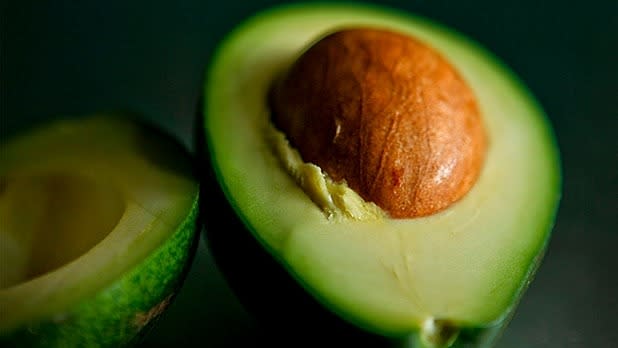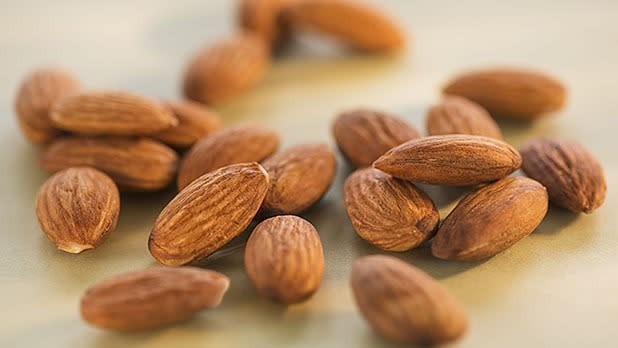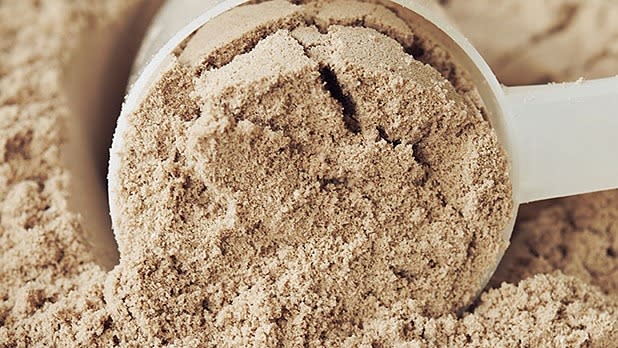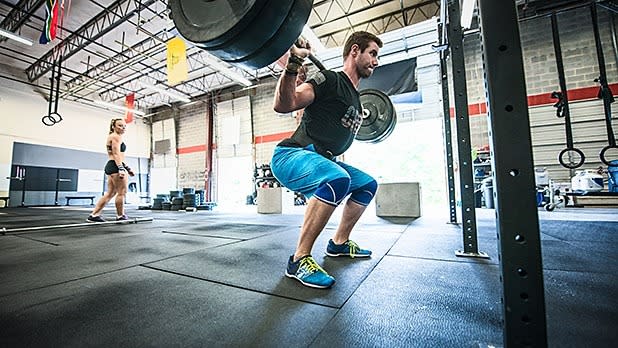A Skinny Guy’s Guide to Bulking Up

(Photo Courtesy of Philipp Nemenz / Getty Images)
No one would confuse wanting to bulk up with wanting to get fat. But in reality, the means to either end are pretty similar. Done the wrong way, trying to bulk up just leaves a guy flabby with no added muscle to show for his efforts. So if you’re looking to gain weight — muscle and heft — you have to be strategic. “It has to be put together just like any successful business plan,” says Jim White, dietician and American College of Sports Medicine exercise physiologist. Here’s your guide.
Related: Get Big, Fast: The 20-Minute Strength-Training Hack
Turn to the Professionals

(Photo Courtesy of Corey Jenkins / Getty Images)
Many people successfully bulk up on their own, but you increase your chances of success if you consult the professionals somewhere along the way. “What I’d recommend is not to jump into any crazy bulking diets that aren’t tailored to you,” says White. “Because, here’s the deal, especially for getting big: you eat a lot, you can gain weight, but you can gain more fat than muscle.” In order to achieve the kinds of gains you want, White advises finding a dietician and a personal trainer who can help you. You can also aim to find someone who performs both jobs, which will likely save you some money.
Related: Do You Need a Personal Trainer?
Get a Partner

(Photo Courtesy of Getty Images)
Another excellent resource to take advantage of is your friends. If you know someone who has reached their own bulking-up goals, they can provide you with valuable advice that won’t cost you as much as a professional. Aside from the firsthand experience they offer, having a friend you can consult with can also keep you motivated and responsible.
Eat More, But Eat Well

(Photo Courtesy of Carmen Troesser / Getty Images)
White says that 80 percent of reaching this fitness goal is about diet. No matter how much you work out or how well you do it, what you eat will be a crucial factor in your success or failure. “You can’t add muscle weight without eating enough calories and proteins,” says White. Macronutrients is the buzzword right now, and the three you should focus on are lean to moderate-lean proteins for muscle growth, complex carbohydrates for energy, and essential fats to support the body’s metabolic processes.
To gain the weight you want, eat high-calorie healthy foods like almond butter, oils, avocados, nuts, red meats (such as steak), and complex carbs (think oatmeal and sweet potatoes). You also want to eat at least two fruits a day, if not more. Veggies are important too but can be filling.
Related: 6 Healthy Foods That Get a Bad Rap
Add About 500 Calories a Day

(Photo Courtesy of Daniel Grill / Getty Images)
It’s true that some people need to double their calorie intake in order to bulk up. These hard gainers are often young with very high metabolisms. Most men should start their bulking journey more slowly. “To gain one pound a week, roughly, from nutrition, you have to add about 500 extra calories a day,” says White. “I’m not a big believer in fast weight gain or loss.” Gaining much faster than that generally indicates a gain of fat rather than muscle. If you increase your calories carefully, you should be able to figure out the amount that hits the sweet spot between bulk and bulge.
Related: The Eat More, Move More Diet
How to Use Protein Powders

(Photo Courtesy of Getty Images)
Protein powders and weight gainers can be a great tool for people looking to gain weight, particularly hard gainers. Protein shakes can contain 500 to 750 calories per shake and are a convenient way to increase caloric intake, even if your appetite is low. White also recommends pumping up the healthiness of your shakes by adding food like oatmeal, bananas, or peanut butter. Be advised that there is some potential for going overboard here. "I would limit it to two drinks a day because otherwise it starts getting into a liquid diet and [whole] food is better,“ says White.
Related: The 11 Tainted Supplements to Avoid
Gain Slowly

(Photo Courtesy of Corey Jenkins / Getty Images)
The American College of Sports Medicine says a weekly gain of one to two pounds is safe, so bulking up significantly is going to take some time. White says you can expect to see a transformation after about three months. This may seem like a long wait but it’s better to take your time and gain weight healthfully.
Get More Sleep

(Photo Courtesy of Corey Jenkins / Getty Images)
With all the intense workouts, you need more sleep. Being rested can also support you in getting the most out of your workouts each day, while working out when tired can negatively affect your form and make you prone to injury. Given the choice between 30 minutes of extra sleep and a 30-minute workout, White says to choose sleep.
Related: The Top 11 Health Benefits of Sleep
Back Off the Cardio

(Photo Courtesy of Eliza Snow / Getty Images)
Guys looking to bulk up have to be very careful about their cardio because it burns a lot of calories, which can make gaining muscle more difficult. Cardio is still key to having a healthy heart, so you don’t want to cut it out completely. Instead, do slower pace cardio, like walking up an incline or using an elliptical. If you do more intense cardio, you may have to up your caloric intake in order to compensate.
Get Beyond the Bench Press

(Photo Courtesy of Thomas Tolstrup / Getty Images)
If you want to look good and bulky, remember to involve your whole body. "Some of the most overused exercises I see, of course for guys, are bench presses,” says White. You definitely want to work out your upper body, but since you won’t be doing much running or cycling, remember to give your lower body attention too.
By Taylor Kubota
More from Men’s Journal:

